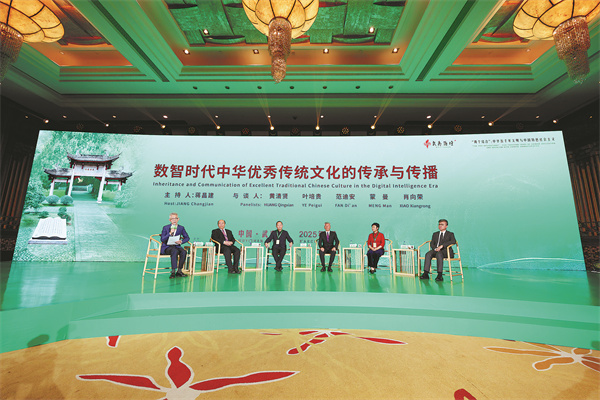
Experts discuss transmission and communication of traditional Chinese culture in the digital intelligence era at the Wuyi Forum in Wuyishan, Nanping city, Fujian province, on March 22.[Photo provided to China Daily]
When Fudan University associate professor Jiang Changjian recited a poem produced by DeepSeek as an impromptu response to history professor Meng Man's remarks about the challenge of teaching in the digital age, Meng couldn't help chuckling.
"The poem wasn't that well-written, but the tone was certainly lofty," she quips, eliciting laughter from the audience at the Wuyi Forum in Wuyishan, Nanping city, Fujian province.
Her lighthearted remark hinted at a deeper truth: while technology can mimic form and tone, it often falls short of capturing the depth of human creativity and emotion.
In the digital age, students have vast amounts of information at their fingertips, but this abundance of knowledge doesn't necessarily translate into true understanding or wisdom, Meng says.
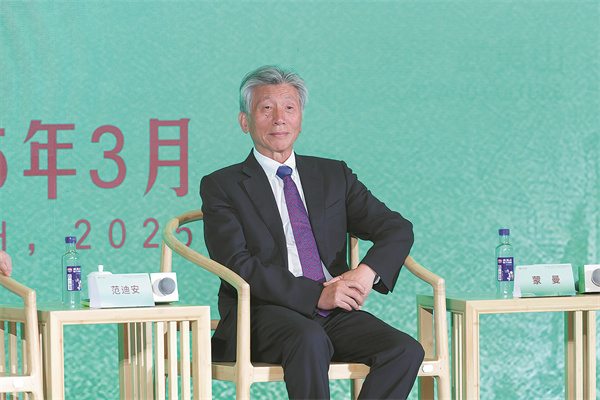
Fan Di'an, chairman of the China Artists Association.[Photo provided to China Daily]
Meng, who is a professor at the Minzu University of China, recalls a trip last year along National Highway 219 from the Guangxi Zhuang autonomous region, across Yunnan province to the Xizang and Xinjiang Uygur autonomous regions, which made her realize just how much she didn't know.
"The world is vast, and the unknown far outweighs the known. The journey itself became a process of mobilizing memories and emotions. When we combine memories, emotions and insights, I believe we gain something more than knowledge — something closer to wisdom," she says, adding that this approach could help address the challenge of teaching in the digital age.
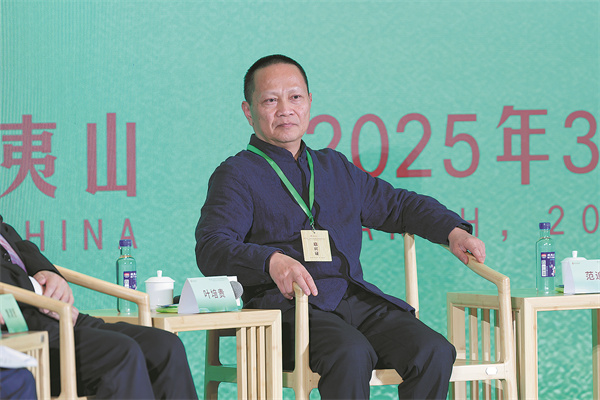
Ye Peigui, professor, Capital Normal University.[Photo provided to China Daily]
On the topic of artificial intelligence-related education, Meng spoke of experimenting with AI and training it to write classical poems, which demonstrated that certain limitations could only be overcome with human effort.
"The AI improved quickly, reaching about 75-80 percent of human quality, but then it plateaued. When I asked a friend why, I was told it had exhausted its data," Meng says.
The AI model couldn't go further because it lacked emotional depth, and without emotion, there's no room for error, and without error, there's no soul, she adds.
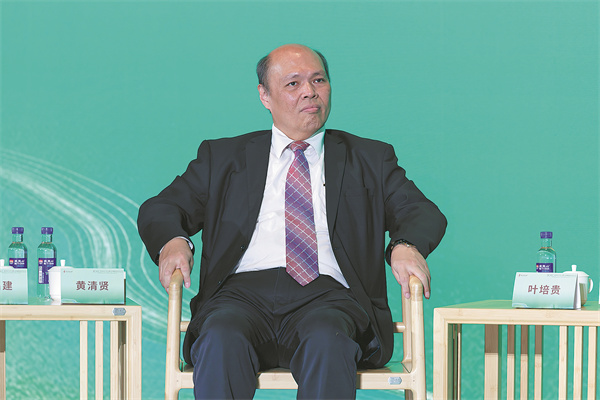
Huang Qingxian, professor, Nankai University.[Photo provided to China Daily]
Meng is one of several experts who discussed the transmission of traditional Chinese culture in the digital intelligence era at the Wuyi Forum, which was hosted by the Renmin University of China and the Nanping government. The forum's goal was to present a broader perspective and more innovative thinking about Chinese civilization and decode its cultural genes.
While AI has its limitations, digital technology also offers unprecedented opportunities for cultural preservation, says Fan Di'an, chairman of the China Artists Association.
He says that the world today is marked by unprecedented global exchange, as well as both opportunities and challenges for the development of society.
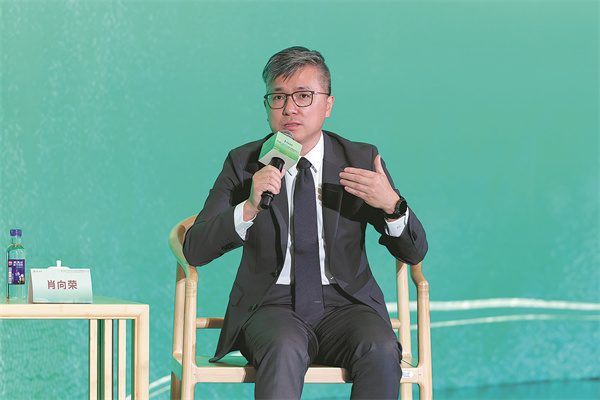
Xiao Xiangrong, professor, Beijing Normal University.[Photo provided to China Daily]
"As we work to share Chinese culture with the world, it is essential to first consider the common topics that resonate globally. Only by addressing shared concerns can we capture interest, as cultural exchange is fundamentally rooted in curiosity — the desire to understand how others think, act, and express themselves. This mutual curiosity is the foundation of meaningful dialogue," Fan explains.
He emphasizes that the Chinese approach is deeply rooted in longstanding cultural traditions and offers insight that can benefit and inspire other cultures.
"For instance, Chinese painting embodies distinctive perspectives on the cosmos, nature, and life itself. Our artistic traditions are supported by a comprehensive system of expressions, one that has captivated international audiences, particularly in the West," he says, adding that these elements not only reflect our heritage but are also a bridge for cross-cultural understanding and mutual enrichment.
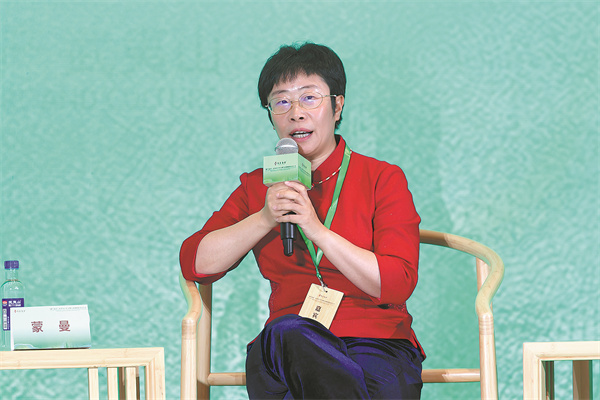
Meng Man, professor, Minzu University of China.[Photo provided to China Daily]
Built on those premises, he believes the digital revolution can open up opportunities for cultural exchange.
Fan points to the transformative impact of digital technologies on the stage, screen, and visual arts, as well as on the preservation of intangible cultural heritage, and appreciates the way digital technology enables the exploration of ancient art in manners that were not possible before.
"Today when we see the Dunhuang murals, the caves have been digitally re-created to reveal intricate details, vibrant colors, and even the dynamic movements of the flying apsaras. It's like stepping back into the Dunhuang era itself," Fan says.
He also says that digital tools have revolutionized the way people enjoy classical Chinese paintings.
"In the past, we could only admire these masterpieces from a distance. Now, we can zoom in to observe the finest details," he says, adding that these immersive digital experiences allow people to connect with tradition.
Ye Peigui, professor at the Capital Normal University and a well-known calligrapher, acknowledges the potential of digital technology in preserving and disseminating calligraphy, but expresses reservations about its ability to fully replicate the art.
While machines can simulate the brushstrokes, they struggle to capture the essence and uniqueness of human expression, he says.
He suggests exploring ways of bringing calligraphy to the forefront, to make its presence felt in every cultural space.
"Calligraphy is deeply embedded in every facet of Chinese culture, yet it often goes unnoticed. People may admire the physical artifacts (the scrolls, the ink, the paper), but they overlook the characters themselves," he says.
Ye also highlights the hands-on nature of calligraphy in education in the digital era.
"Calligraphy is a very practical art. To truly appreciate it, one must pick up the brush and write. The act of writing creates a powerful connection," he explains.
Xiao Xiangrong, dean of the School of Arts and Communication at Beijing Normal University, cautions against overreliance on AI, despite its transformative potential.
"AI, like cameras and film before, is ultimately a tool. What matters most is the person using it," he says.
"However, the rise of AI is also a wake-up call for artists. We cannot afford to be ordinary; we must strive to be unique. This brings us back to the essence of art itself," he adds.
Xiao emphasizes that AI's true potential lies in helping us explore the future. He expresses excitement about the possibilities of storytelling in the digital age and calls upon other artists to not only embrace technology, but also to ensure that it serves their creative vision.
Huang Qingxian, professor at the Zhou Enlai School of Government, Nankai University, underlines the importance of leveraging digital intelligence to preserve and promote China's cultural heritage while fostering cross-cultural understanding.
He recommends data-based systematization of China's UNESCO intangible cultural heritage listings to create a foundation for deeper exploration and understanding.
"Once systematized, digital tools can be used to analyze and interpret the complexities of Chinese culture," he says. This opens up more approachable and engaging access to its depth and richness, even to those unfamiliar with its nuances.
In terms of the future of cultural transmission, Meng says that those involved must hold onto lofty and transcendent ideals, and trust in the shared imagination of humanity, such as the universal dreams of beauty and harmony that connect all people.
"It is the foundation of our exchanges, our dialogues, and our shared destiny as a community. If we ever lose this, we lose our path. But as long as we believe, the way forward will always reveal itself," she says.
Meng also proposes approaching cultural transmission with a sense of ease and accessibility.
She points out that even Song Dynasty (960-1279) philosopher Zhu Xi, with his deep knowledge and philosophical insights, believed that the simplest expressions — like a song — could convey profound truths.
Similarly, when the treasures of Chinese culture are presented with ease and openness, everyone can understand the "few notes of wisdom", she says.